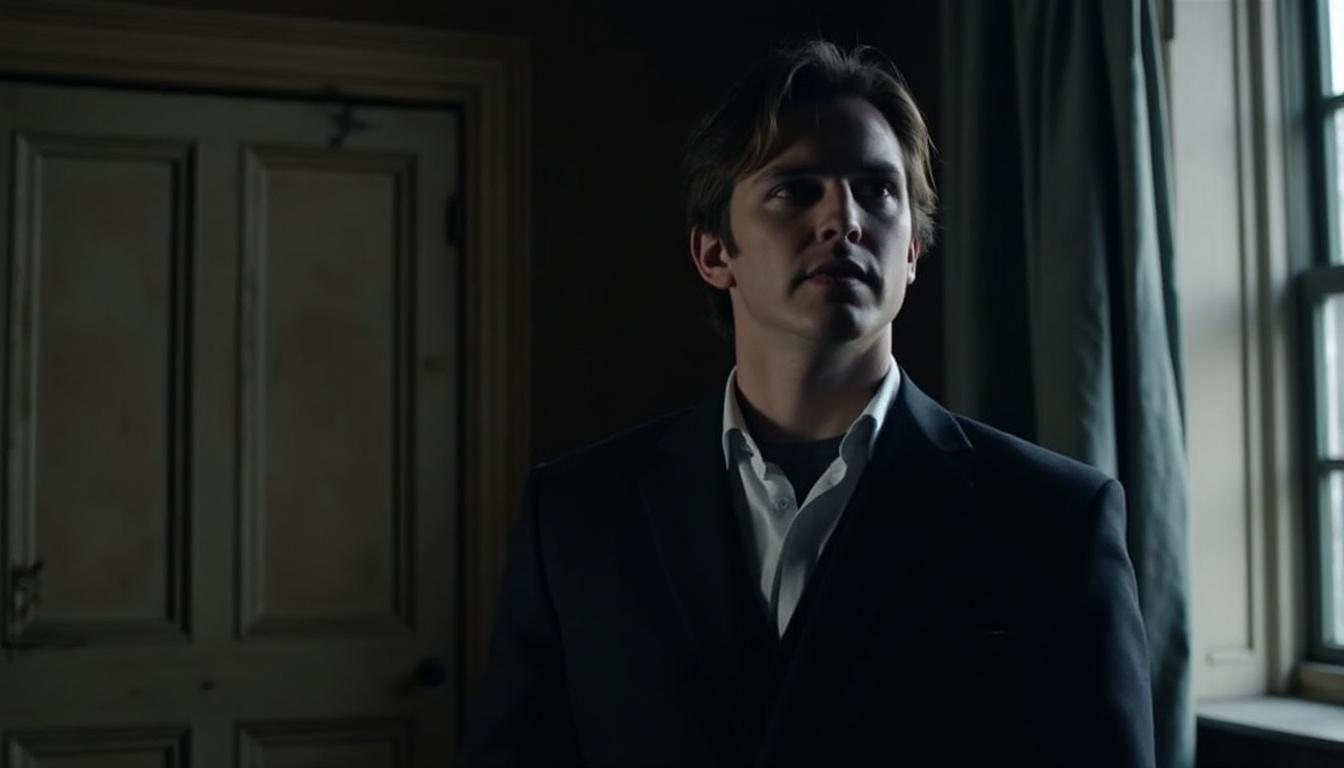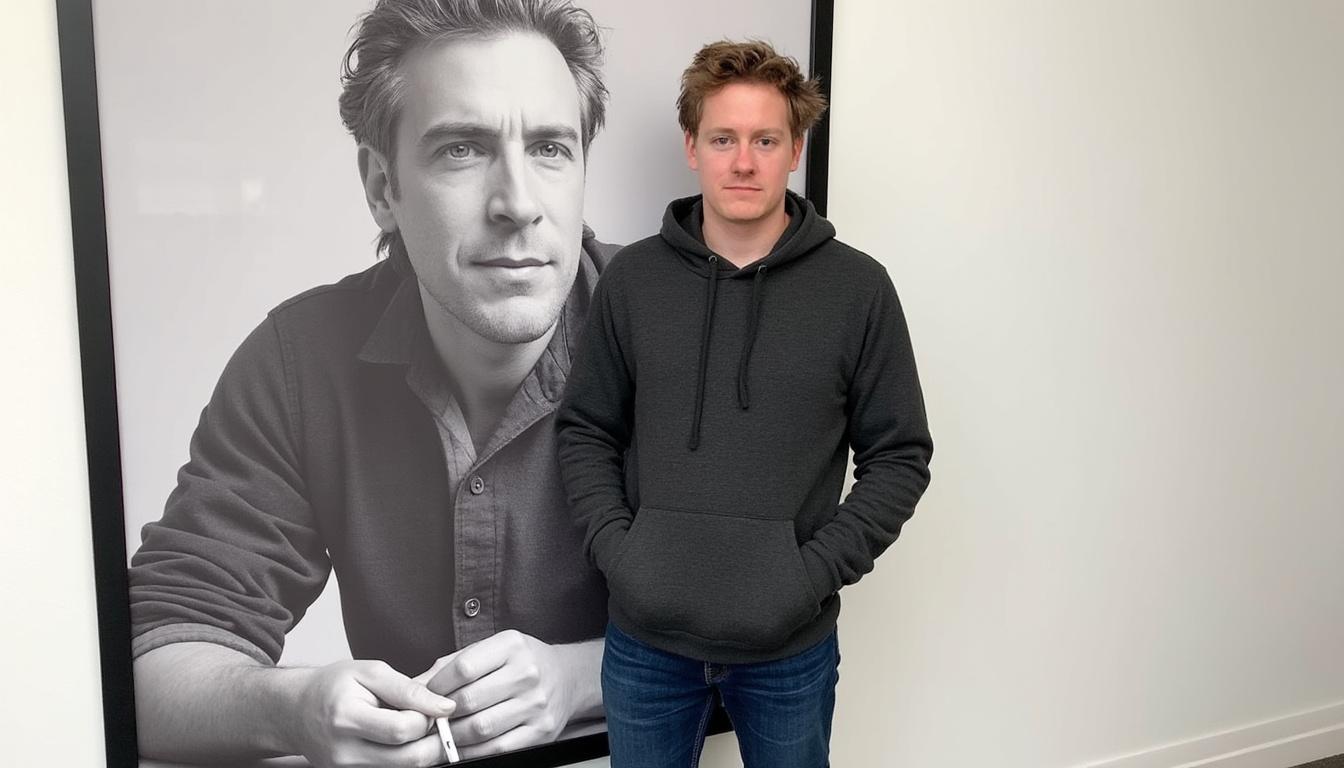In a world where familial legacies carry significant weight, Cooper Hoffman, the son of late Oscar-winning actor Philip Seymour Hoffman, finds himself navigating the complex landscape of Hollywood with both admiration and trepidation. The nuanced relationship between parent and child can sometimes feel like a double-edged sword, filled with honor and expectation. As Cooper pushes forward in his acting career, he openly discusses the anxiety that accompanies his father’s rich legacy. Both a source of motivation and a cause for self-doubt, this legacy presents a significant challenge for the young actor as he takes on forthcoming roles in movies like The Long Walk.
Cooper Hoffman’s Journey in Acting: Building His Own Legacy
Cooper Hoffman’s entrance into acting has been marked by a notable debut in Paul Thomas Anderson’s acclaimed film Licorice Pizza (2021). With a significant artistic lineage to navigate, he carries not just the name but also the artistry associated with his father’s work. Notably recognized for powerful performances in films like Capote, Doubt, and The Hunger Games series, Philip Seymour Hoffman left an indelible mark in the film industry. Therefore, Cooper’s journey represents a blend of ambition and a critical need to carve his own path amid expectations.
- Acting Debut: Cooper debuted with Licorice Pizza, showcasing natural talent and charisma.
- Nominations: His authentic performances led to a Golden Globe nomination for Best Actor.
- Upcoming Projects: Following successes, Cooper stars in the adaptation of Stephen King’s The Long Walk.
A deeper look reveals how Cooper views his past experiences as shaping factors. He recalls reflecting on his father’s career, acknowledging the fear that accompanies such a profound legacy. “The only person I really wanted to talk to was my dad,” he confesses, illustrating the personal struggle of wanting validation from a figure whose judgment is closely intertwined with industry standards. The dichotomy of idolizing someone intimately connected to personal experience—as both an inspiring figure and a benchmark—produces a palpable tension that Cooper continues to confront.

Navigating Expectations and Self-Doubt
Within the Hollywood sphere, the specter of nepotism can create complex dynamics. Cooper finds himself wrestling with the residual effects of his father’s fame while grappling with his ambitions. The term “nepotism” often appears in discussions about privilege within this industry, leading to scrutiny and heightened expectations. While he benefits from his father’s established reputation, it also adds layers of uncertainty to his burgeoning career.
The pressures manifest not only within the industry but also in Cooper’s psyche, as he battles self-doubt and anxiety about meeting expectations. “I would be terrified to have him see my stuff and judge my stuff,” he states, highlighting an emotional layer of fear associated with the possibility of failing to live up to his father’s stature. This sentiment is indeed commonplace among children of highly acclaimed figures—it raises questions about the value assigned to one’s individual talents against a formidable familial backdrop.
| Key Film Performances | Year | Awards |
|---|---|---|
| Capote | 2005 | Academy Award Winner |
| Doubt | 2008 | Academy Award Nominee |
| The Hunger Games: Mockingjay | 2014 | Multiple Award Nominations |
| Licorice Pizza | 2021 | Golden Globe Nominee |
| The Long Walk | 2025 | Upcoming |
This emotional complexity does not only reflect Cooper’s connection to his father; it also sheds light on a broader phenomenon seen among young performers in Hollywood. The pressure to succeed can trigger anxieties, not merely about performance but about individual identity and purpose. As Cooper embarks on his path, it’s apparent that the lingering echo of his father’s judgment forms both a pillar of inspiration and a daunting obstacle.
Living in the Shadow: The Parent-Child Relationship in Hollywood
The simplistic lens through which outsiders often view Hollywood families obscures the intricate reality of their internal dynamics. Cooper’s relationship with his father is described with depth and nuance; it’s rooted in both admiration and a desire for personal validation. “He’s my favorite actor,” Cooper asserts, laying bare the duality of his admiration for Philip, who not only excelled in the craft but also served as a pivotal emotional anchor in his life.
In grappling with the legacies left behind, actors like Cooper often experience their work as a mirror reflecting back on familial expectations. The quest for authenticity becomes a cornerstone in this struggle—a method to differentiate oneself from the past and embrace a unique narrative. This is particularly poignant when one reflects upon the losses felt in the wake of tragedy; Cooper’s father passed away when he was just ten years old from drug-related complications. This untimely loss imbued Cooper’s trajectory with an additional layer of sorrow and responsibility to both honor and transcend his father’s legacy.
- Emotional Complexity: A parent’s death can lead to unresolved feelings and heightened emotional stakes in a child’s career.
- Legacy Perception: Navigating the public perception of one’s family’s name plays a significant role in shaping identity.
- Artistic Heritage: Many actors grapple with carrying a familial banner while also pursuing their passion independently.

Reflections on Fear and Judgment in Performance
As Cooper steps into roles that require emotional vulnerability, he brings his father’s spirit with him, albeit with apprehension about how his performance will be perceived. “He was a very empathetic person,” Cooper reflects, suggesting that he believes his father’s judgment might be colored by understanding rather than harsh critique. This empathy serves as a guiding light as he works consistently to channel that spirit into his own acting.
Cooper’s awareness of his father’s feedback casts a long shadow. Despite acknowledging his father’s kind nature, he cannot suppress the innate human fear of judgment by a loved one. The experience of performing while drawing parallels to his father illustrates the shared unease among many in the creative world: Does the art resonate, and will it carry its own weight despite familial ties?
The Long Walk: Crafting a Path to Self-Discovery
The highly anticipated The Long Walk offers Cooper a platform to explore themes of grief and healing, elements that tie closely to his personal experiences. Set against the dystopian backdrop of a Stephen King adaptation, the screenplay allows for various manifestations of emotional struggle, affording Cooper an opportunity to confront his fears head-on while harnessing the essence of his father’s influence in a more indirect manner.
As the narrative unfolds, the character Cooper portrays becomes a vessel for expressing sorrow and resilience—attributes that seem reflective of his own journey. Our relationships with parental figures often inform the way we navigate anxiety and expectations, be they external or internal. As Cooper engages in this emotional landscape, it’s essential to observe how he articulates his character’s narrative: “I get to figure this out on my own,” he states, indicating a desire for independence and a personal journey toward acceptance.
- Character Themes: Addressing self-discovery while incorporating emotionally rich narratives enhances performance depth.
- Handling Grief: Finding solace in the creative process while addressing personal loss allows for authentic growth.
- Exploring Vulnerability: Embracing vulnerability confirms one’s strength in confronting personal and professional fears.
| Upcoming Projects | Release Year | Role |
|---|---|---|
| Wildcat | 2023 | Lead Role |
| Saturday Night | 2024 | Key Character |
| The Long Walk | 2025 | Protagonist |
The struggles faced by Cooper illustrate a universal truth about the art of acting: it pushes individuals beyond their perceived limits while providing an avenue for expression. His story is not just a quest for recognition; it serves as a reminder of the profound impacts that parent-child relationships have within the highly competitive and fickle world of Hollywood. As Cooper continues to build on the legacy of his father, he asks himself critical questions about identity, creativity, and acceptance, which audiences await to see unfold on screen.
Finding Strength Amidst Anxiety and Judgment
Ultimately, Cooper Hoffman’s journey reflects both the inherent beauty and the daunting challenges of stepping into a parent’s legacy. The pressures that come with this duality often lead to deep wells of anxiety and self-doubt, particularly in an industry marked by rigorous demands and public scrutiny. Balancing the desire for paternal approval with the need for individual expression has become his guiding principle. One of the critical elements of his evolution lies in understanding how judgment, particularly that of a beloved parent, can serve as both a burden and a source of strength.
As aspiring actors in Hollywood recognize their paths, they continue to wrestle with how personal and professional identities intersect. The evolution of this relationship between Cooper and his father transcends decades, illuminating both the fragility and the resilience of love. The conversation around self-acceptance and the emotional nuances discovered along the way opens a broader discourse within the acting community about the expectations laid upon new generations of artists.
- Embracing Individuality: A key takeaway involves anchoring one’s identity within their artistic journey despite the past.
- Building Support Networks: Engaging with mentors, peers, and personal connections creates avenues for emotional resilience in pursuing one’s craft.
- Redefining Success: Understanding that success is multifaceted and includes personal growth, not solely professional accolades.
Cooper Hoffman’s evolution into a prominent figure in the entertainment world serves as a testament to hard work, resilience, and the enduring power of a familial legacy. As he continues to embrace the challenges ahead, the essence of his father undoubtedly walks alongside him—a reminder that while the road may be fraught with judgment, the path to self-discovery is illuminated by love.


